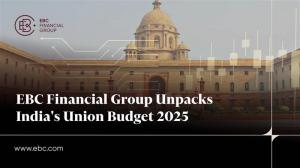India’s Budget 2025 accelerates fintech and AI growth but faces an investment gap. EBC Financial Group explores key insights and industry implications.
INDIA, February 14, 2025 /EINPresswire.com/ -- India's Union Budget 2025 introduces significant fiscal measures aimed at stimulating economic growth and enhancing investor confidence. The budget outlines substantial tax reforms, increased capital expenditure, and
strategic initiatives across various sectors. However, challenges such as global trade uncertainties and inflation management persist, requiring careful navigation by investors and traders. EBC Financial Group (EBC) provides an in-depth analysis of these developments and their potential impacts on the financial landscape.Revitalising Consumer Demand Through Tax Reforms
The budget proposes significant changes to personal income tax, including making income up to ₹1.2 million ($14,800) tax-free and reducing tax rates for incomes up to ₹2.4 million. These measures are expected to improve household savings and encourage greater consumer spending, particularly in sectors such as consumer goods, real estate, and automotive. While this provides an optimistic outlook for these industries, market conditions, inflation, and global economic factors will play a role in determining the extent of growth. EBC analysts note that investors may observe shifts in demand and corporate earnings in consumer-driven sectors as a result of these tax reforms.
Catalysing Economic Expansion Through Infrastructure Investments
India’s Finance Minister, Nirmala Sitharaman has allocated ₹11.21 lakh crore ($132 billion) towards capital expenditure (capex), focusing on infrastructure projects. This large-scale investment is expected to drive employment and boost related industries such as construction, transportation, and renewable energy. While historically, such spending has had a positive multiplier effect on economic growth, investors should monitor sectoral performance over time to assess the actual impact. According to EBC analysts, market conditions, policy execution, and external economic shifts will influence how businesses in these sectors benefit from the announced spending.
Evolving U.S.-India Trade Relations and Market Impacts
Recent discussions between U.S. President Donald Trump and Indian Prime Minister Narendra Modi signal a potential shift in bilateral trade relations. Modi’s proposal to reduce tariffs and increase U.S. imports—including oil, gas, and military equipment—could open new economic avenues, while reciprocal tariffs imposed by the U.S. may introduce challenges for Indian exports. Both leaders have set a target to double bilateral trade by 2030, a move that could significantly impact investor sentiment and cross-border capital flows. However, industry experts warn that the introduction of reciprocal tariffs by the U.S., which could start coming into effect April 1, may increase the cost of importing high-tech products, potentially influencing India’s technological and AI development trajectory. Investors should remain vigilant to how these geopolitical shifts affect India’s financial markets and sector-specific opportunities.
Advancing the Fintech and Artificial Intelligence (AI) Frontiers
India’s Budget 2025 highlights the government’s strategic commitment to strengthening its fintech ecosystem and positioning the country as a global leader in AI-driven financial services. However, while these measures reflect progress, EBC analysts caution that a significant investment gap remains, particularly in foundational AI research.
A key highlight of the budget is the government's push towards AI and digital transformation. Speaking at Paris’s AI Action Summit, Prime Minister Narendra Modi reiterated the need for open-source AI frameworks and sustainable development, highlighting AI’s role in job creation and economic growth. The budget introduces tax incentives and simplifies regulatory procedures for fintech startups, aiming to accelerate digital payment adoption and financial inclusion.
Despite these advancements, industry analysts note that India's AI investment lags behind global competitors, particularly China. While China boasts 47% of the world’s top-tier AI talent, India accounts for just 5%, largely due to talent migration and limited deep research infrastructure. The rise of China's DeepSeek, an AI disruptor that has built cost-efficient foundational models rivalling those of OpenAI’s ChatGPT and Google’s Gemini, signals the urgency for India to enhance its AI capabilities. While new U.S. tariff measures may raise the cost of importing AI tools and cloud computing infrastructure, this shift presents an opportunity for India to accelerate domestic AI innovation and build a more self-reliant tech ecosystem. As global supply chains adjust, India’s fintech and AI sectors could benefit from increased local investment, fostering homegrown advancements and reducing long-term dependencies on foreign technology.
Encouragingly, some Indian firms are beginning to recognize the need for deeper AI investments, but the transition remains slow. While India’s leading IT companies have historically focused on low-risk, high-margin outsourcing services, there is growing momentum for AI-driven transformation. The government’s $1.2 billion allocation to the India AI Mission marks an initial step, yet it remains modest compared to the $24 billion dedicated to manufacturing subsidies. To capitalize on AI’s potential, stronger public-private partnerships and targeted funding will be critical in turning India from a consumer into a global innovator in AI technologies.
As the digital finance and AI landscapes evolve, regulatory developments, competitive market dynamics, and consumer adoption will play a crucial role in shaping the sector’s trajectory. While fintech innovation presents promising opportunities, EBC notes that India’s ability to establish itself as an AI powerhouse will depend on how policymakers and industry leaders balance the need for immediate economic stability with long-term deep-tech investments.
Empowering Investors with Market Intelligence
As global markets navigate complex economic cycles, EBC provides investors with market insights and access to a broad range of trading solutions. Through EBC’s proprietary trade platform, traders gain access to real-time market data, risk management tools, and diversified financial instruments to adapt to evolving economic conditions.
For more insights on market shifts, macroeconomic trends, and investment strategies, please visit https://www.ebc.com/.


No comments:
Post a Comment